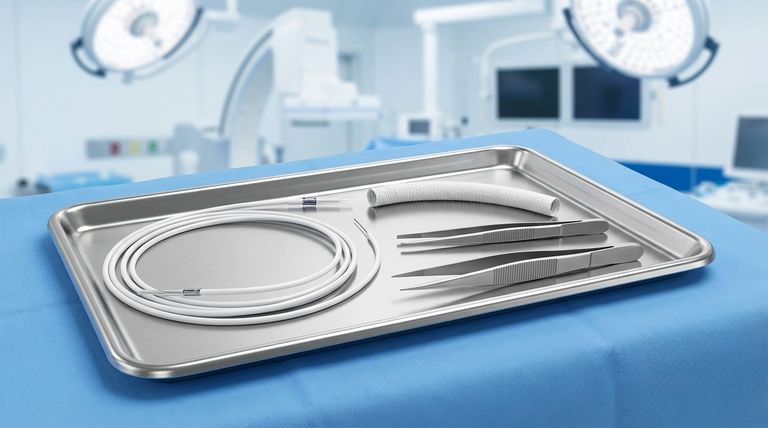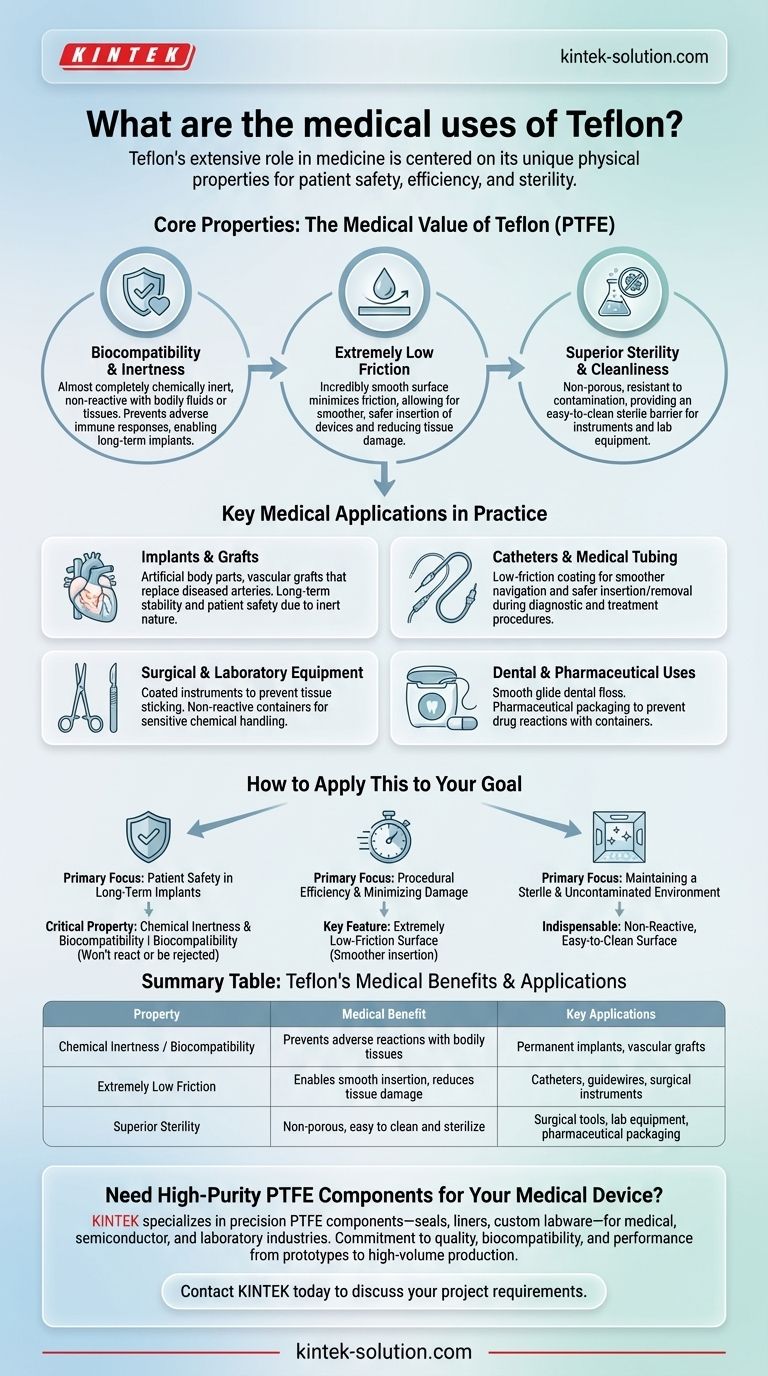Teflon's role in modern medicine is extensive and is centered on its unique physical properties. It is widely used as a low-friction, non-reactive coating for surgical instruments and catheters, as a core material for permanent implants and artificial body parts, and in sterile applications like pharmaceutical packaging and dental floss.
The core reason Teflon, or Polytetrafluoroethylene (PTFE), is so valuable in medicine is its unique combination of three key traits: it is almost completely chemically inert, it is biocompatible with human tissue, and it has an extremely low coefficient of friction.

The Core Properties That Make Teflon Medically Valuable
To understand why Teflon appears in so many medical devices, we must first look at its fundamental characteristics. These properties solve critical challenges in patient safety, procedural efficiency, and sterility.
Unmatched Biocompatibility and Inertness
Teflon is exceptionally non-reactive. This means it does not react with bodily fluids, tissues, or bones when placed inside the human body.
This biocompatibility prevents adverse immune responses, inflammation, or rejection, making it a trusted material for long-term implants.
Extremely Low Friction
Famously known for its "non-stick" quality in cookware, this same property is vital in medicine. Teflon's surface is incredibly smooth, minimizing friction.
This allows medical devices like catheters and guidewires to be inserted into blood vessels and other parts of the body with significantly less force, reducing the risk of tissue damage during delicate procedures.
Superior Sterility and Cleanliness
Teflon’s surface is non-porous and resistant to contamination. It provides a sterile barrier that is exceptionally easy to clean and sterilize.
This makes it an ideal coating for surgical instruments and lab equipment, where preventing cross-contamination and ensuring absolute hygiene are non-negotiable.
Key Medical Applications in Practice
These core properties translate directly into a wide range of practical applications, from life-saving implants to everyday dental products.
Implants and Grafts
Because it is not rejected by the body, Teflon is used to create artificial body parts, such as vascular grafts that replace or bypass diseased arteries. Its inert nature ensures long-term stability and patient safety.
Catheters and Medical Tubing
The low-friction coating on catheters is one of Teflon's most common medical uses. This "slippery" surface allows for smoother and safer insertion, navigation, and removal of tubes used for diagnosis and treatment.
Surgical and Laboratory Equipment
Surgeons use instruments coated with Teflon to prevent tissue from sticking during procedures. In the lab, its non-reactive surface is perfect for containers and equipment used with highly sensitive or reactive chemicals.
Dental and Pharmaceutical Uses
Teflon's properties are also utilized in specialized areas. It can be found in certain types of dental floss for its smooth glide and in pharmaceutical packaging to ensure that sensitive medications do not react with their containers.
Understanding the Trade-offs and Considerations
While Teflon's properties are highly beneficial, material selection in medicine is always a matter of context. No single material is perfect for every application.
Focus on Specific Strengths
Teflon is chosen primarily for its inertness and low friction. For applications requiring extreme durability or high wear resistance in a load-bearing joint, engineers might select other materials like specialized polymers or metal alloys.
The Importance of Purity
The "medical-grade" designation is critical. The manufacturing process for medical Teflon ensures a level of purity and consistency that prevents any unwanted materials from causing a reaction in the body.
Evolving Material Science
Teflon set a benchmark for biocompatible polymers. However, research is continuous, and newer composite materials are constantly being developed to meet even more specialized medical needs, often building upon the principles that made Teflon so successful.
How to Apply This to Your Goal
Understanding the primary goal of a medical application helps clarify why Teflon is often the material of choice.
- If your primary focus is patient safety in long-term implants: Teflon's chemical inertness is the most critical property, ensuring it won't react with or be rejected by the body.
- If your primary focus is procedural efficiency and minimizing tissue damage: Its extremely low-friction surface is the key feature for devices like catheters and guidewires.
- If your primary focus is maintaining a sterile and uncontaminated environment: Its non-reactive, easy-to-clean surface makes it indispensable for surgical tools and lab equipment.
Ultimately, Teflon's unique combination of safety and high-performance functionality has made it an indispensable material in advancing modern patient care.
Summary Table:
| Property | Medical Benefit | Key Applications |
|---|---|---|
| Chemical Inertness / Biocompatibility | Prevents adverse reactions with bodily tissues | Permanent implants, vascular grafts |
| Extremely Low Friction | Enables smooth insertion, reduces tissue damage | Catheters, guidewires, surgical instruments |
| Superior Sterility | Non-porous, easy to clean and sterilize | Surgical tools, lab equipment, pharmaceutical packaging |
Need High-Purity PTFE Components for Your Medical Device?
KINTEK specializes in manufacturing precision PTFE components—including seals, liners, and custom labware—for the medical, semiconductor, and laboratory industries. Our commitment to quality ensures the biocompatibility and performance your applications demand, from prototypes to high-volume production.
Contact KINTEK today to discuss your project requirements and leverage our expertise in custom PTFE fabrication.
Visual Guide

Related Products
- Custom PTFE Parts Manufacturer for Teflon Parts and PTFE Tweezers
- Custom PTFE Parts Manufacturer for Teflon Containers and Components
- Custom PTFE Teflon Balls for Advanced Industrial Applications
- Custom PTFE Sleeves and Hollow Rods for Advanced Applications
- Custom PTFE Square Trays for Industrial and Laboratory Use
People Also Ask
- What are the benefits of using Teflon bushings? Achieve Maintenance-Free, High-Performance Operation
- What is RPTFE and why is it commonly used for valve seats? Enhance Durability in Demanding Applications
- What are PTFE Bellows seals and where are they commonly used? The Ultimate Guide to Corrosive Fluid Sealing
- What are the key properties of fluoroplastics used in PTFE lined valves? Ensure Purity and Reliability
- What are the main machining techniques used for PTFE? Achieve Precision with CNC Turning, Milling & More
- Why are PTFE spring energized seals preferred in the oil and gas industry? Unmatched Resilience for HPHT & Corrosive Environments
- What lubrication benefits do PTFE bushes provide? Achieve Maintenance-Free, Low-Friction Performance
- Why is surface treatment necessary for PTFE sheets used in tank linings? Ensuring a Secure and Reliable Bond



















